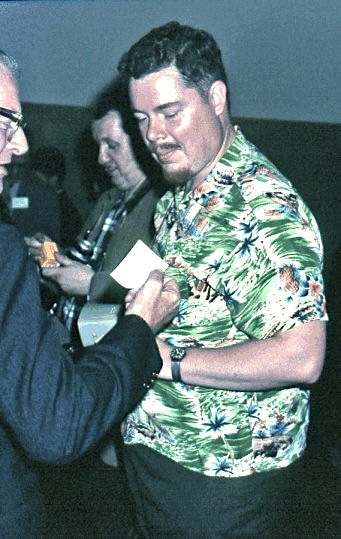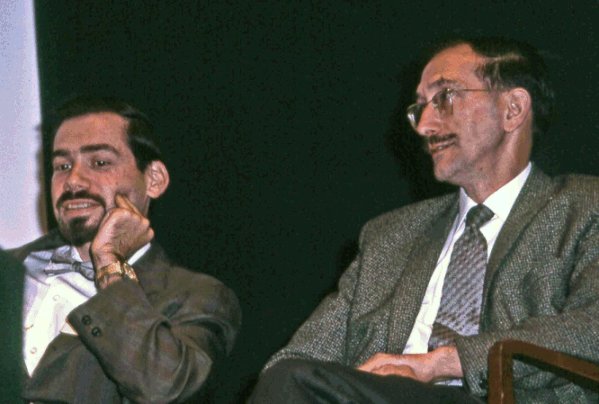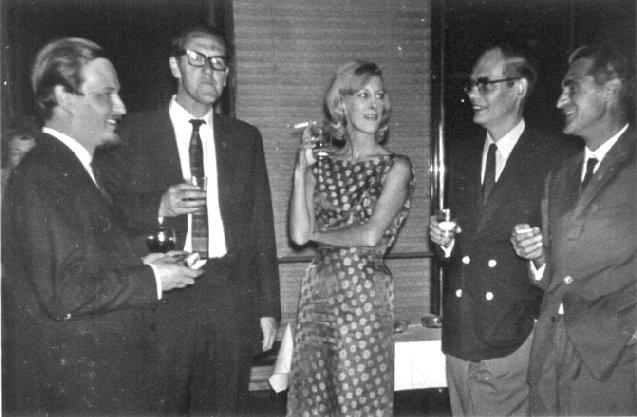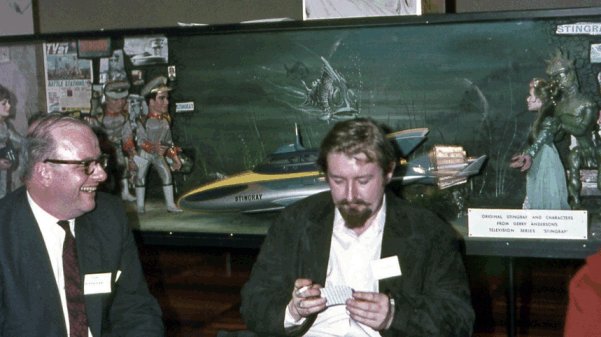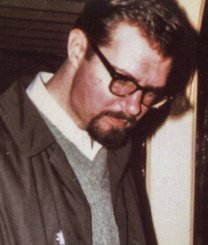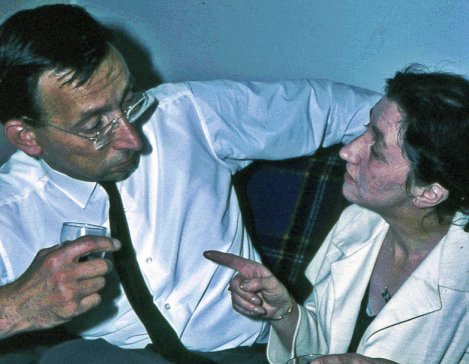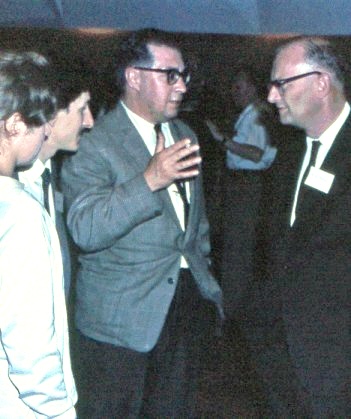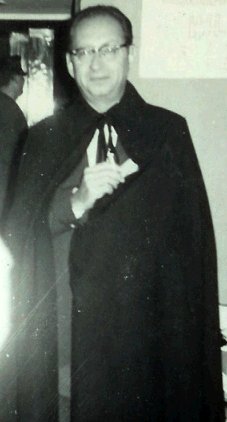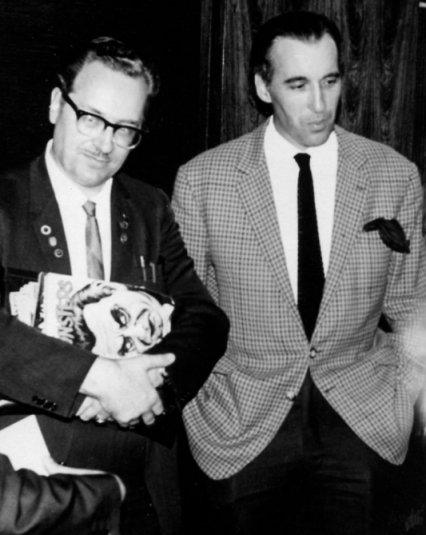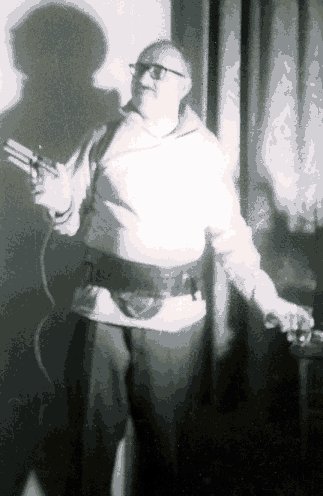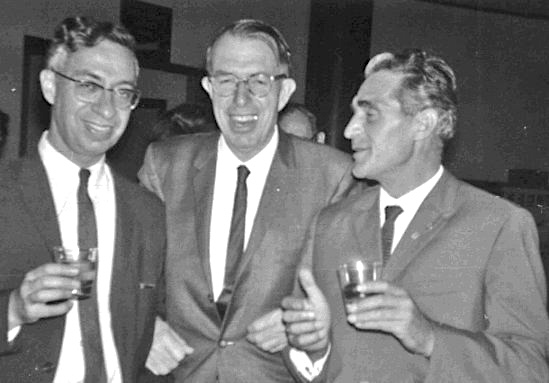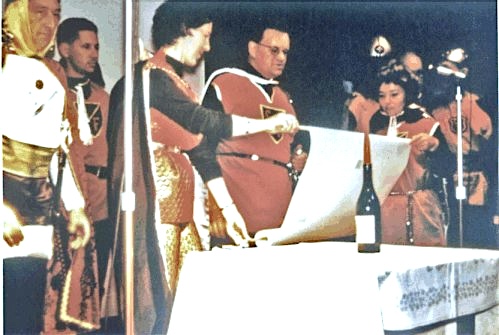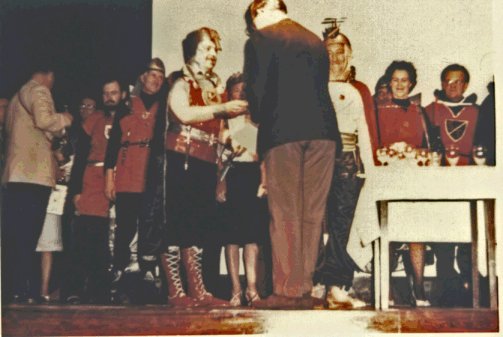Sunday 29th AugustTERRY CARR:Next morning at the con there was a panel scheduled for 9:00 am that included Bob Silverberg; despite a great effort on my part, I missed all but the last ten minutes of it. Afterward I asked Bob how he managed to be coherent at that time of morning at a worldcon and he just said, 'It's not as hard as you imagine -- remember that all of the audience is just as sleepy as you are.'
RON BENNETT: Dick Eney chaired the Sunday morning professional panel, "A Robot in the Executive Suite," upon which appeared Judith Merril, Robert Silverberg, Ken Bulmer, Terry Carr, James White and Poul Anderson. Quickly defining that a robot is but a programmed computer, Anderson said that computers could be best employed for work not fit for human beings to do, such as garbage collection, working with radioactive materials or in subscription departments of magazines. Life Magazine, he said, employs IBM computers to conduct its subscriptions department. He told the story of a particularly humid New York day upon which one of the Life computers got a little out of hand sending some three thousand subscription renewal notices to one man who happened to be a sheep herder living out in the wilds of Montana. The local post office had to take a special truck out to the sheep herder who was at time out tending his sheep. He returned to find his porch piled high with sacks of letters. He went through them all and then sat down and sent a cheque to the magazine's President with the attached note, "You win!" Judith Merril wondered how a robot would edit a SF magazine and Ken Bulmer looked at robots from "the other end of the scale" where experience is the whole point of human existence. Once one has done something, postulated Bulmer, this can never be repeated - in terms of experience. A robot, a machine, could tap these experiences with pleasurable experiences fed directly into one's brain. Anderson said that the problem concerning machines was not the robots·themselves but, as always, Man. If robots ever reached the point where they would try to make us chromeplated replicas of themselves then this would be something that man has done to himself. We should, he reasoned, be careful about the pockets of life into which we introduced them.
Bob Silverberg suggested that we should isolate our fear of robots which he claimed was not a fear of robots putting road sweepers out of work - "We've lived with that problem since the Industrial Revolution" - but more a fear of the berserk computer, the computing machine which begins to programme itself, where the control is taken from our hands. Anderson felt that such an occurrence was unlikely, saying that we could always pull out the plug or refuse to read such a machine's silly advice, concluding that a computer's main worth is to give good advice in a complex situation, presenting the optimum way of doing something in a given set of circumstances. He admitted that there are problems impossible for a robot to solve, but felt that a properly functioning robot would manage to get members of a panel into a convention hall on time at 10 a.m., and would ensure that an audience of seventy and a panel of five would function at an optimum level. TERRY CARR: I do remember inviting every former TAFF delegate at the con to a summit meeting at which we discussed TAFF policy and especially the next TAFF election; it was at that meeting that I proposed 'Hold Over Funds' as a choice on all ballots (thereby anticipating No Award by several years), and most people agreed to it. At that time, even as now, some people were worried that there might not be a qualified TAFF candidate to be found; but though the 'Hold Over Funds' option has appeared on every TAFF ballot since then we've never yet failed to find a candidate to elect. Someone took a photo of the attendees at this meeting and I still have a print of it: it shows all of us, with spouses, crammed onto one bed (no, no, it wasn't that kind of party!): Ron Bennett, Ethel Lindsay, Wally Weber, Ken and Pamela Bulmer, Arthur and Olive Thomson, Carol and me, Walt Willis, and all the other TAFF winners up to that time except Don Ford, who wasn't there. I suppose it's a Historic photo; I'd planned to put it on the cover of my TAFF report, but of course I never wrote that. (Don Ford had of course died in April that year.) RON BENNETT: Banquet tickets for the thirty-five shilling ($5) meal had been sold out by the end of the Convention's first day and with the seating limited to 150 there were reports of tickets being offered for sale by as much as £4, though it is not known whether there were any takers. The menu was: Consommé aux Etoiles; Filet de Sole Sullivan; Contrefilet Rose Perigourdine, Crottled Greeps and Pommes Amandine; Peche Jules Verne. Coffee and a glass of Pere Jean wine (for the traditional toast) rounded off an excellently prepared but sparsely presented meal. Opinions of those approached upon the matter seemed well united, that the proportions were small, that the service was disappointing, that the meal was overpriced and that those who came into the hall for the after-lunch speeches only, had well saved their money. Particularly as the standard of the speeches was in no way comparable with that of the meal. Tom Boardman, the banquet's Toastmaster, gave the news that the Gemini II spacecraft had finally come to earth, some fifty minutes previously, after its record breaking flight, an announcement heartily applauded by the assembly. It was worthy of reflection, said Boardman, that one attendee had been asked by the same press who would report this fact to appear in a public place in fancy dress. In introducing the Worldcon's Guest of Honour, Brian Aldiss, Boardman said that it was difficult to find something new to say about a writer whom he had first met in 1957, whom he had re-met in Harrogate in 1962 and who was now co-editor of. SF Horizons, a former Hugo Winner, an ex-President of the BSFA and a writer known to all to stand “hips, trunk, shoulders, arms and head alongside anyone you want to mention."
Brian Aldiss first made reference to the passing Boardman, "A nice guy. You'd never know he was a publisher, would you?" He had wondered what to do and say, continued Aldiss, intending to prepare a feast for the gathering. He had been thinking of admitting to being Kyril Bonfiglioli but then he had turned up, he had thought about giving the low-down on an estimable professional sitting amongst the audience, about what really happened to the old manuscripts submitted to Ted Carnell, how a famous Hollywood monster is to publish the Forry Ackerman Magazine, why Fred Pohl has the British edition of Galaxy delivered via the North Pole - in a rowing boat, about Mike Moorcock…."No, I couldn't tell you about him ….", why Harry Harrison has had to leave Denmark, why Arthur C. Clarke has had to stay in Ceylon,…but, said Aldiss, Harry Harrison gave the same talk at Birmingham. Instead Aldiss reviewed the changes in sf since the last London World Convention, in 1957.
At that time, said Aldiss, the dominant mood was still embodied in the paranoiac stories of the type written by A.E. van Vogt, in which the hero is the victim of a worldwide conspiracy, but in the end he licked the lot of them. Asimov was somewhat similar but his hero would undergo a loss of identity and a loss of memory. He would still go on to lick the lot. Orwell reversed this, although his story was still basically that of van Vogt. Here the hero underwent the loss of identity at the end of the story. Nowadays there are other, perhaps more healthy problems. We have the satire of Vonnegut and the "inner space" of Ballard. The space is objective, said Aldiss, but man is more and more in the centre. These are stories of man reacting upon his environment rather than the environment reacting upon man. Also today, Aldiss continued, we are now in the age of the common spaceman. He parodied a recent earth to satellite conversation in which an astronaut had been talking to his wife. "How are you?" "I'm fine, honey. How are you?'' ''I'm fine, honey, just fine." "And how are the kids?" "They're fine, too." As you see, Aldiss remarked drily, the age of the common spaceman. He had been, he went on, recently looking up a copy of a 1955 Galaxy - which had just arrived in this country - and he quoted a descriptive passage in which stars appear as holes in a black, velvet curtain, commenting that the oratory of ten years ago seems humorous today, “like the works of Henry James - but funny." This makes for better SF, Aldiss said, for we must change with changing conditions. All this, he concluded, was the speech he had prepared, which he had been rehearsing naked in front of a full length mirror. However, he now realised that he was unable to give the speech he really had intended to give, for John Brunner had given it the day before. BRIAN ALDISS (in letter to THEN): While I was making my GoH speech, rear doors opened and a figure entered waving a cable. It was Cy Endfield, celebrated director of Zulu and other movies. The cable was from Joseph E.Levine in Hollywood, guaranteeing Cy $30m if he - and I as scriptwriter - made an SF film called 'Only Tomorrow' before Clarke and Kubrick got their act together an 2001. An exciting moment. We haven't made the film yet. RON BENNETT: TAFF delegate Terry Carr was introduced by Tom Boardman who explained briefly the organisational workings of the Transatlantic Fan Fund. (When recalling this twenty years later, Terry misremembered Forry Ackerman as having been the toastmaster. This being so, I've taken the liberty of substituting Tom's name for Forry's in the section below.) TERRY CARR:
At the Hugo banquet I sat next to Brian Aldiss up front: he was the Pro GoH and I was Fan GoH. I was terrified by the prospect of having to make a speech, however short: I'd never done that before at a con. I barely touched my food, whatever it was, and Brian was wonderful in the way he chatted with me to calm me down. Tom Boardman, the toastmaster, stood up and said, 'I'm delighted to have Brian Aldiss here as Guest of Honor, but I wish the late E.E. Evans could be here with him ... so I could say that we had Aldiss and Evans too.' The attendees groaned, even as I did, but for different reasons: I was thinking that that lousy pun was probably better than anything I had to say. Tom introduced Brian, who gave a polished speech none of which I remember (I was too busy trying to keep from throwing up from nervousness), and then Tom introduced me. I have no idea what words of praise Tom used; I was too twitchy by then even to listen to egoboo, and could only sit there wishing Tom would make endless puns till the whole audience went away. But he didn't, and I had to get up and make my speech. I'd written it out beforehand, and even practiced it once or twice, but I was still terrified. When I began talking the microphone failed and somebody had to fix it; I prayed that it would dissolve and we could all go home, but that didn't happen, and there I was before the whole convention audience who waited for me to speak. (All the Hugo Banquet speeches can be heard here. For Terry, go to the 18:47 mark - Rob.) Astonishingly, I managed. I even ad-libbed an opening -- something that insulted Dave Kyle's bid for next year's worldcon in Syracuse, New York and got several laughs; I think I said, 'Next year we'll be in Cleveland unless we get lost and go to Syracuse' -- and then I went into my prepared speech. I delivered it almost word-for-word from my text, and since I've managed to save my script to this day, I can reproduce my TAFF speech here. At which point I formally announced the opening of nominations for the next election, explained the new 'Hold Over Funds' option, and sat down. The speech had drawn some laughs in most of the right places, but I'd noticed that they all came from either the first few rows in front or the last few in back; I was told later that the PA system hadn't been working quite properly, so that only those near the rear speakers had gotten the benefit of the microphone, and, since I tend to speak softly, only those near the very front had heard my voice unaided by the speakers -- so even if you were there that afternoon, this may be the first time you've had to find out what I said.
Walt Willis, who'd been sitting near the back with Chuch Harris, had a somewhat different theory, as I discovered later when he showed me the notebook in which he'd been exchanging written comments with Chuch, who's deaf. Chuch had written, 'What's happening? Only a few people seem to be laughing,' and Walt had replied, 'Terry's making puns that are too sophisticated for them.' I wish Walt had been right. Mentioning Chuch Harris reminds me of what happened when I first met him a day or two earlier. We were on an elevator, just getting off at some floor, and next to the elevator was an automatic shoeshine machine. Chuch said, 'Look -- an electric neofan!' RON BENNETT:
Arthur C. Clarke followed, entitling his talk, "How I Learned to Stop Worrying and Love Stanley Kubrick." He had been commissioned to write a book about space for Time-Life and had met Kubrick in New York with the idea of an epic space film on the lines of How The Solar System Was Won. Kubrick had bought five of his short stories but had eventually settled upon only one, whereby Clarke immediately bought back the remaining four at a thousand dollars apiece. The provisional title of the film, "Journey Beyond the Stars" had now been changed to "2001 - The Space Odyssey," with the screenplay by Kubrick and Clarke, based upon a novel by Clarke and Kubrick. It is difficult showing convincing extraterrestrials, said Clarke, and it was not true that Peter Sellers was going to play them all. ''Though Peter was willing," he added. The film will be shot in Cinerama and if a month's scheduled shooting takes place as planned next spring, at which time will also appear the book (which is not yet finished), then the film should be released around Christmas 1966. Clarke said that he hoped it would become the contemporary space travel film, the Destination Moon of the 1970's. In closing he held up a nail from the Bounty and a piece of the heat shield from the Apollo space craft. These were, he explained thoughtfully, two artefacts with less than 200 years between them.
The programme's promised mystery speaker turned out to be Robert Bloch, much to the delight of the assembly. "I'm so pleased to be here today in... er," Bloch began, referring to a card, "London." He said that he was feeling a little drunk - ''George O. Smith breathed on me" - and mentioned that he was in London to make a new film, "Mary Poppins Meets the Wolfman." But it's nice to be here, Bloch said. It's nice to see Karen Anderson, and What's His Name. And John Campbell, "whose editorials I've been ghost writing for years." He said that he had had a rough trip over. He hadn't realised just how rough it had been until he saw the captain heave the anchor, and he'd also had an accident with his luggage when the port feIl out. He'd seen Westminster Abbey, the poor man's Forest Lawn, and had visited the Tower of London, though there he'd been disappointed. He'd wanted to see a Beefeater and had found himself talking to a vegetarian. Back at the hotel, he said, someone had come up to him and had asked for money to the Willis Fund. "But how can I be sure," he'd asked, "that this money will get to Willis?" "You can be sure of it," he'd been told, "l am Willis." Bloch went on to talk about some of his relatives. “Relatives run in my family," he said, "Especially when they see me coming." For example there was his cousin Mildred. “He's a nice, fellow," said Bloch, telling of the time Mildred had had his spine removed and had had to be taken home in a bucket. He was, he concluded, very glad that he'd come. “I've made my peace with God," he said. "He surrendered two weeks ago." Quite a talk. Forry Ackerman spoke about the Big Heart Award, saying that after the death of E. Everett Evans certain individuals had got together to honour those who work in fandom is often left unrecognised. He spoke of previous winners, Rick Sneary, Bjo Trimble, James Taurasi and Sam Moskowitz. This year, he said, the award is being made to someone at this side of the Atlantic. Although, Ackerman said, there, is no particular fandom in Italy or in France, there is a considerable fandom in Germany and there is one man who has done more than any other for German fandom, a man whose heart is so large that it embraces East Germany as well as West Germany. He called upon the Award's first recipient, Bob Bloch, to make the award to Walter Ernsting, the "Father of German SF." In doing so Bloch said briefly, "Don't do as I did - pawn it." Ernsting said that he was too overcome with emotion to make a speech. "This is a big surprise," he said, "and my heart is too full. And when my heart is great, then my mouth is small." He thanked those presenting the award for recognising German fandom and said that he felt that the Award was given to German fandom rather than to himself personally.
The speeches had at this point been running for exactly one hour, and it was now time to present the Hugo Awards for the best and most able sf, of the past year. Robert Silverberg, who said it was both an honour and a pleasure to have the task of presenting the Hugos then gave one of the most humorous speeches of the weekend, this humour depending entirely upon his manner of delivery. He first spoke of the agonies of Isaac Asimov who two years before had been in a similar position and who at the time had mentioned that he had never won a Hugo. As he had made presentation after presentation Asimov had grown gloomier and gloomier. He had wrestled a little with the Award winners, trying to take from them their statuettes, and as the presentations had progressed Asimov's anguish had grown and grown. Then finally he had come to the last sealed envelope. He had torn it open and had found his own name. "I have my Hugo," Silverberg said." It is a little smaller than this one here. But it's a nice Hugo. I like my Hugo." The delivery here, with a pause between each sentence, was perfect. Silverberg's Hugo, he explained was presented in 1956 for "The Most Promising New Author." Brian Aldiss had won a similar Award in 1959, but as this category had since been discontinued he supposed that Aldiss was still the most promising author in SF. He remembered, he said, the evening when he was awarded a Hugo, how suspense had mounted and how he could not eat the meal because of his wanting to come to the Awards. He had remembered Arthur Clarke discussing the future history of the world and how his own torment had mounted as Arthur progressed through the 1960's and 1970's. "You can imagine how I felt by the time Arthur reached 2953," Silverberg said. But, he continued, he would not keep the present award winners in suspense any longer. "I have the names right here in this envelope," he announced 'turning out his pockets one by one as he searched for it. Eventually he found it and waved it about…slowly. The envelope was marked, Silverberg said, "Top secret. Destroy before reading." Very deliberately, Silverberg opened the envelope. “Here are the winners' names," he said. "Oh, that reminds me." He had asked Ella Parker what he should do if he personally did not approve of the names on the sheet, but he had promised to read them faithfully. Silverberg then made the presentations of the Hugo Awards (though not of the physical trophies as these were not ready, and still would not be several months later): BEST NOVEL: The Wanderer by Fritz Leiber (Ballantine Books) BEST SHORT STORY: Soldier Ask Not by Gordon Dickson in Galaxy. BEST MAGAZINE: Analog. BEST FANZINE: Yandro edited by Robert & Juanita Coulson. BEST ARTIST: John Schoenherr BEST PUBLISHER: Ballantine Books BEST DRAMATIC PRESENTATION: Dr. Strangelove Peter George, on whose novel, Red Alert, the film Dr. Strangelove was based, was awarded the drama Hugo, the only award of this year's seven to remain in this country. The full details of the voting can be found here. CHARLIE WINSTONE: After the presentation of the Hugo Awands by Robert Silverberg, everyone retired to the Convention hall to see the Delta Group's other presentation, BREATHWORLD - an hilarious skit on Harry Harrison's DEATHWORLD, This proved so popular that it was re-shown later on.
Ted White followed with a talk entitled "How to Plot Your Way Out of a Paper Bag". RON BENNETT: Ted White, Assistant Editor of The Magazine of Fantasy & SF spoke on "How to Plot Your Way Out Of A Paper Bag," saying that his title came from a remark that J. G. Ballard could not plot his way out of a paper bag. There seems to be an element in sf who are simply not able to plot. They are reactionary. Whilst they look to the future they stick to twentieth century writing. We seem to abound in writers who do not know their craft and who seem to be filling especially the British magazines with “stories which start nowhere and go nowhere." White agreed that it is time for a "new look in sf," something exposes the inner consciousness, though he admitted that every time he heard mentioned Ballard's name he thought of' Philip K. Dick who has been doing the same thing longer and better, for a lengthy period of time exploring schizophrenia and other realms of unreality. It is nothing new, White suggested, to peg a story upon psychological cases, citing Raymond Chandler as one who was writing such stories at a time when Sf was in its infancy. There is a tendency, White continued, for SF to copy mainstream fiction, but mainstream fiction is by its very definition very limited, (White defined mainstream fiction as any which could not otherwise be readily classified, something which did not fit into any category of genre fiction). Mainstream fiction is merely the same story over and over again, the story of John and his wife, both of whom live down the street. White said that he read for entertainment therefore he demanded a good, rousing story. SF could provide entertainment for him if it so wished for it had its root in the adventure of the pulps. And it was adventure that he wanted, White said, adventure in its broadest terms, giving as an example Tolkien's sweep and scope. This, he said, is adventure. "Let us not lose sight of the fact," said White, "that we are story tellers, not preachers and not psychotherapists."
"From Cradle to Collector" was the title of the Sunday evening panel which featured as Moderator Ted Carnell (the weekend's best co-ordinator of opinion) who was more than ably supported by authors Jack Williamson and Fred Pohl, Tribune critic Doug Hill, Mayflower Books buyer John Watson, reader Chris Priest, publisher Ron Whiting and Penguin Books editor Tony Godwin. The panel mainly discussed various aspects of reviewing and the manner in which reviews affect sales. Ron Whiting said that a bad review was not as detrimental as one might think, saying that it was better to be talked about in such a manner than not being talked about at all. He would like to see, however, more than a mere small box at the bottom of a page devoted to sf. He pleaded for more constructive reviewing and asked that a reviewer did not simply seize upon one small bad point and base his review upon that. Jack Williamson said that poor reviews could have their compensation. He recalled that one of his books had been panned as "a space comic strip." He had been immediately contacted and commissioned to write a space comic strip which had run for three years! Frederik Pohl said that all SF could expect in most papers was the small boxed reviews and that it was only in the SF magazines that one could hope to meet understanding. He deplored the one word reviews given in most papers and mentioned that he had once seen a box review of a Horace Gold book labeled merely 'Good.' The following week the same book had been, because of a lack of memory, reviewed again. This time it had been labelled ‘Terrible.' Pohl also expressed the opinion that too many writers write for other writers and for reviewers rather than for the readers. Tony Godwin said that only rarely do reviews have any effect upon editorial policy for usually he sees material direct from hardcover publishers before the books are published and reviewed. Godwin also felt that SF should be reviewed by someone with a special sympathy for the genre. Often, he said, the point of the book was missed completely by a mainstream reviewer. Chris Priest said that the fan saw the whole spectrum of reviews, from Amis to the fanzines but that the fanzines could not be taken as a true criterion because of one-author prejudices. Doug Hill pointed out that a reviewer is not a critic. He spoke of his own approach to reviewing, mentioning that he keeps in mind a picture of a young reader, probably a student, who would wish to get the best value for his two-and-six.
The Revival Ceremony of The Most Noble and Illustrious Order of St. Fantony which took place on the Sunday evening suffered somewhat from lack of rehearsal but as this was the first meeting of the Order for some eight years and as Knights and Ladies had gathered from the far flung reaches this was both understandable and excusable. One nominated knight, who shall, in order to avoid embarrassment, remain unnamed, failed the strict initiation test but the Order was pleased to elevate into its ranks the following honoured worthies: Ethel Lindsay, Ken Bulmer, Ted Carnell, Ken Cheslin, Dick Eney, Harry Nadler, Phil Rogers, Tom Schlück and Tony Walsh. BSFA Librarian Joe Navin was also nominated but was unable to attend the Convention.
TERRY CARR:
Carol and I ended up the evening in Judy Merril's room where she held the dead-dog party at
which Harry Harrison went around drawing red felt-tipped pen nipples on the Victorian
ladies depicted in the wallpaper, and there was a delightful exchange among Judy, Brian
Aldiss and Sid Coleman:
Judy: I'm going down to Oxford tomorrow to meet J.G.Ballard, but I don't know how to
pronounce his name. Is it Ballard, or Ballard?
Brian: It doesn't matter. Call him by his first name, and remember that he's a big
fan of Herman Melville. In fact, when he meets anyone who isn't a Melville fan he
says: "Fuck off!"
Sid: Ah! Now we've established the first line in their conversation. Judy says "Hi,
Jimmy" and he says "Fuck off! Call me Ishmael."
That party lasted throughout the night, and at dawn Willis said,
'I can see the rising sun coming through a chink in the curtains.' Forry said, 'Ah yes ... the
Yellow Peril.' I marveled at Forry's quickness with a pun until I realized that Walt must
have deliberately set him up for it. Walt's fondness for Forry, in part because of their
mutual admiration for puns, had been demonstrated for me.
|
